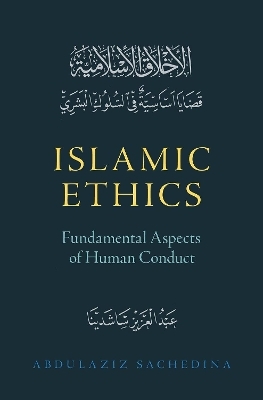
Islamic Ethics
Oxford University Press Inc (Verlag)
978-0-19-758181-0 (ISBN)
Abdulaziz Sachedina is Professor and Endowed IIIT Chair in Islamic Studies at George Mason University in Fairfax, Virginia. He has been conducting research and writing in the field of Islamic Law, Ethics, and Theology (Sunni and Shiite) for more than four decades. In the last twenty years he has concentrated on social and political ethics, including Interfaith and Intrafaith Relations, Islamic Biomedical Ethics and Islam and Human Rights. He is the author of numerous books, most recently Islam and the Challenge of Human Rights (OUP, 2009).
ACKNOWLEDGMENTS
CHAPTER 1: INTRODUCTION
CHAPTER 2: IN SEARCH OF A COMPREHENSIVE DEFINITION OF ETHICS
CHAPTER 3: GENESIS OF MORAL REASONING IN RELIGIOUS ETHICS
CHAPTER 4: SCRIPTURAL SOURCES OF ETHICAL METHODOLOGY
CHAPTER 5: NATURAL LAW AND ETHICAL NECESSITY
CHAPTER 6: ETHICS OF INTERPRETIVE JURISPRUDENCE
EPILOGUE
END NOTES
SELECT BIBLIOGRAPHY
| Erscheinungsdatum | 27.06.2022 |
|---|---|
| Verlagsort | New York |
| Sprache | englisch |
| Maße | 238 x 164 mm |
| Gewicht | 544 g |
| Themenwelt | Geisteswissenschaften ► Psychologie ► Allgemeine Psychologie |
| Geisteswissenschaften ► Psychologie ► Verhaltenstherapie | |
| Geisteswissenschaften ► Religion / Theologie ► Islam | |
| ISBN-10 | 0-19-758181-1 / 0197581811 |
| ISBN-13 | 978-0-19-758181-0 / 9780197581810 |
| Zustand | Neuware |
| Informationen gemäß Produktsicherheitsverordnung (GPSR) | |
| Haben Sie eine Frage zum Produkt? |
aus dem Bereich


